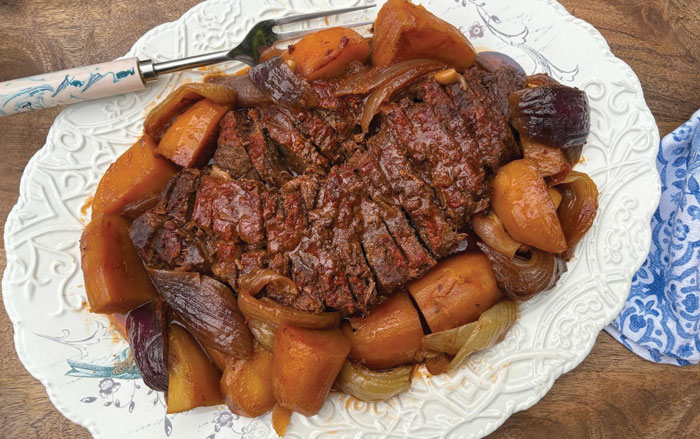 Photo by Sephardic Spice Girls
Photo by Sephardic Spice Girls As a Jew of Babylonian descent, for me Pesach is synonymous with Silan, a deliciously dark brown glistening date honey. This caramelized syrup is combined with crushed walnuts to use as charoset. (Charoset represents the mortar the Jews used to make bricks when enslaved by the Ancient Egyptians.)
As a Jew of Babylonian descent, for me Pesach is synonymous with Silan, a deliciously dark brown glistening date honey.
In Iraqit, the Judeo-Arabic spoken by Iraqi Jews, charoset is referred to as “ha’lek.” For me, there is no sweeter Pesach memory than my grandmother’s crystal bowls filled with freshly crushed walnuts and homemade Silan. To this day, my favorite part of the seder is spooning a layer of this date charoset onto matzo and then making Korech, the Hillel sandwich with matzo, charoset and romaine lettuce. Not just because by that point in the seder, I’m starving. But because Silan is just that mesmerizingly sweet and addictive.
During my childhood in Australia, my great-uncle Nuri and his wife Auntie Tina would spend days preparing the dates, cooking them and squeezing them through cheesecloth to separate the juice from the pulp. Then that juice would be slowly simmered in a huge pot until it was a perfect thick syrup. Before Pesach, they would proudly present my grandparents and close family and friends with a big glass bottle of Silan.
When we moved to America, my mother and father started making their own Silan and sharing it with family. My cousin Sarah Sassoon, author of the children’s book “Shoham’s Bangle,” has also embraced making Silan for her family and friends in Israel.
True confession — I’ve never tried my hand at the lengthy and labor-intensive process of making Silan. I’m perfectly satisfied with the organic, no sugar added jars of Silan from Israel.
With the mass aliyah of the early 1950’s, Iraqi Jews brought Silan to Israel. Just like amba (pickled mango), that other unique Iraqi staple, Silan has become a prized ingredient of the Israeli kitchen. Silan works brilliantly as a marinade for chicken, beef and lamb, as a sweetener in salad dressings, desserts and smoothies, and drizzled over fruit, yogurt and granolas. Iraqi Jews also mix Silan with tahini paste to make “rashi,” a peanut butter-like treat that my father particularly loved to spread on fresh pita.
—Sharon
Recently, Sharon and I were discussing our menus for Pesach. We agreed that roasting a piece of beef was the easiest way to please a crowd.
For the English, it’s a classic Sunday roast. For the French, it’s rosbif. For the Jews, it’s a Shabbat roast. For the Sephardic Jews I grew up with, it’s called Roti and it’s almost always eaten for Friday night dinner or festive holiday meals.
Roti translates to roast. Roti is always made with red wine and onions. Sometimes it will be made with potatoes and other times with lots of mushrooms and it was always part of the dinner menu.
I love to make a nice French roast, adding Dijon mustard as a foil to the red wine and sweet onions. For the holidays, I add prunes, which lend the meat a sweet and tangy flavor.
But this week, we share Sharon’s special recipe for chuck roast with a homemade Silan barbecue sauce.
Chuck is an overlooked, inexpensive cut of meat that works perfectly for Shabbat and Jewish holidays, when dishes often spend extended time in the oven before being served. This recipe cooks low and slow with lots of potatoes and onions in a delicious sauce made with organic tomato paste, Silan, brown sugar, red wine vinegar and smoky paprika.
Save the extra barbecue sauce in the fridge and use it as a marinade for chicken or mix with kosher for Passover mayonnaise to make your own Western sauce for hamburgers.
We promise that this recipe guarantees the most tender, juicy roast beef. You will love the simplicity of the recipe. Your family and friends will love the results.
—Rachel
Bon Appetit! Awafi!
—Rachel and Sharon
Silan Barbecue Chuck Roast
1 3-4 lb chuck roast
3 Tbsp avocado or olive oil
10 medium Yukon gold potatoes, washed and chopped in quarters
2 tsp kosher salt
1 tsp ground black pepper
2 red or yellow onions, sliced
10 cloves garlic, coarsely chopped
2 cups chicken broth or water
3/4 cup Silan barbecue sauce
• Preheat oven to 300°F.
• Place brisket in a large oven-proof baking dish.
• Drizzle oil over the brisket.
• Arrange potatoes around the brisket and sprinkle with kosher salt.
• Add onions and garlic on top of the potatoes, then pour chicken broth over the vegetables.
• Spoon the sauce over the brisket.
• Cover tightly and roast in the oven, about 3 hours until fork tender.
• Remove baking dish from the oven and let cool.
• Remove meat from the dish and carve into thin slices.
• Pour juices over the meat, cover tightly and return to oven to reheat 30 to 40 minutes before serving.
Silan Barbecue Sauce
1 6oz can organic tomato paste
One cup brown sugar
1 cup organic Silan
1/2 cup red wine vinegar
1 Tbsp smoked paprika
1 Tbsp garlic powder
1 Tbsp onion powder
2 tsp salt
1 tsp freshly ground black pepper
• In a medium bowl, whisk together tomato paste, brown sugar and Silan.
• Add red wine vinegar and stir well.
• Add paprika, garlic powder, onion powder, salt and pepper and combine.
•Store in a tightly sealed jar in the refrigerator.
Sharon Gomperts and Rachel Emquies Sheff have been friends since high school. The Sephardic Spice Girls project has grown from their collaboration on events for the Sephardic Educational Center in Jerusalem. Follow them on Instagram @sephardicspicegirls and on Facebook at Sephardic Spice SEC Food. Website sephardicspicegirls.com/full-recipes.























 More news and opinions than at a Shabbat dinner, right in your inbox.
More news and opinions than at a Shabbat dinner, right in your inbox.